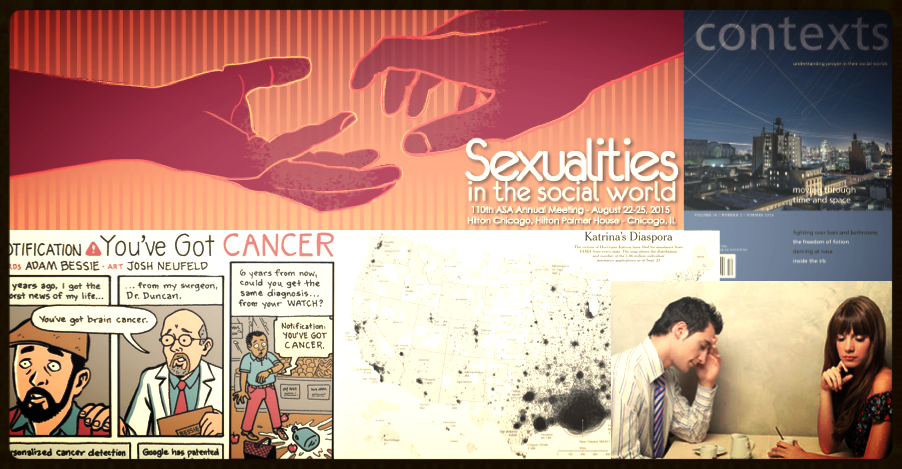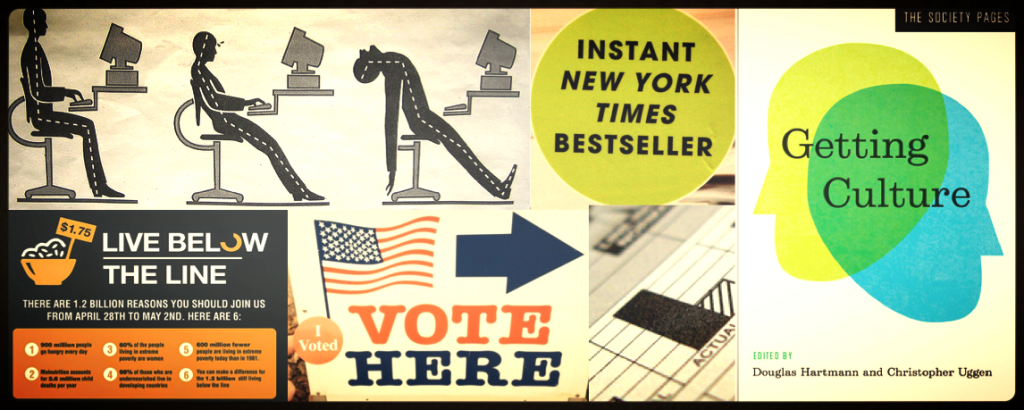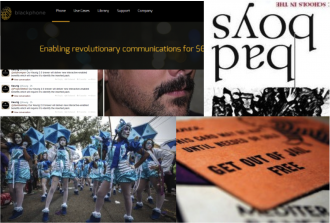Hellllllooooo, Chicago! Here’s what TSP’s been up to this week—some excellent reads as sociology converges on the Windy City. Be sure to say hi to our grad board members and editors as we make the rounds, and watch our Twitter for some live-tweeted-panels courtesy @EvanStewart23 (with Jacqui Frost, our graduate editor).
There’s Research on That!
“We All Live with the Effects of School Segregation,” Evan Stewart with research by Gary Orfield, Susan E. Eaton, Grace Kao, Daniel T. Lichter, Domenico Parisi, and more.
Discoveries:
“Freshman 15 or Family-First 50? College and Family Sequencing Affect Obesity.” Sarah Catherine Billups sums up Journal of Health and Social Behavior research from Miech, Shanahan, Boardman, and Bauldry.
Clippings:
“‘Moving to Opportunity’ After Katrina.” Billups shares some sociological highlights from a New Yorker article on mobility and displacement in New Orleans. Featuring David Kirk, Patrick Sharkey, Stefanie DeLuca, and Corina Graif.
Contexts Magazine:
“Bathroom Battlegrounds and Penis Panics,” Kristen Schilt and Laurel Westbrook. How transgender rights legislation got framed as “bathroom bills,” with seemingly everyone trying to mark their territory.
Scholars Strategy Network:
“The Downside of Separating ‘Good’ Undocumented Immigrants from ‘Bad’ Criminals,” by Abigail Andrews. “As long as protection seems conditional on quiet and deferential personal conduct, any approach that divides undocumented migrants into good versus bad categories reinforces secondary status for all.”
Council on Contemporary Families:
“Getting Current on Cohabitation,” by Virginia Rutter. “Fifteen years ago, the going wisdom on cohabitation was that marriages preceded by living together were more likely to fall apart—that news is out of date.”
A Few From the Community Pages:
- On Sociological Images, a new Yale project parses Americans’ opinions on climate change and research shows college students believe in the benefits of diversity while also touting “color-blindness”.
- Families As They Really Are shares 5 ways professors can help single mother students.
- Feminist Reflections on graphic art and social change.
Last Week’s Roundup
Sign Up for Inbox Delivery of the Roundup
Our Latest Book
Check out Getting Culture (just $15!)





 A tag-cloud for this week’s roundup might be astounding and jarring, since it runs the gamut from candy and cohabitation to affirmative action revision, diversity trends among the powerful, community health centers in Texas, and 20 years of remembrance in Rwanda. Herewith: what we’ve been up to this week.
A tag-cloud for this week’s roundup might be astounding and jarring, since it runs the gamut from candy and cohabitation to affirmative action revision, diversity trends among the powerful, community health centers in Texas, and 20 years of remembrance in Rwanda. Herewith: what we’ve been up to this week.

 This week we talked about American debt and folded a whole new and incredibly interesting sector of debtors into the conversation: those who’ve gone through the criminal justice system. That’s careful wording, by the way, because you don’t even have to be convicted—just charged—to start racking up legal fees with compounding interest and compounding effects on your future. We also got a look at how race affects school suspensions and the oft-overlooked problem of homelessness among college students. No, it’s not all good news, but with the right information and appropriate action, we can keep moving toward the good news, right? That’s worth something! For palate cleansers, we offer the annual Mardis Gras archive, the DRM-coffee-bot, and why we shouldn’t let law enforcement end up based on the quality of business owners’ gaydar.
This week we talked about American debt and folded a whole new and incredibly interesting sector of debtors into the conversation: those who’ve gone through the criminal justice system. That’s careful wording, by the way, because you don’t even have to be convicted—just charged—to start racking up legal fees with compounding interest and compounding effects on your future. We also got a look at how race affects school suspensions and the oft-overlooked problem of homelessness among college students. No, it’s not all good news, but with the right information and appropriate action, we can keep moving toward the good news, right? That’s worth something! For palate cleansers, we offer the annual Mardis Gras archive, the DRM-coffee-bot, and why we shouldn’t let law enforcement end up based on the quality of business owners’ gaydar.  This week TSP featured great content on immigration, drugs, and healthcare reform from heavy hitters, as well as the incredibly popular Sociological Images monthly recap and a caveat from our editor, keen even with one eye on the Klout scores.
This week TSP featured great content on immigration, drugs, and healthcare reform from heavy hitters, as well as the incredibly popular Sociological Images monthly recap and a caveat from our editor, keen even with one eye on the Klout scores.